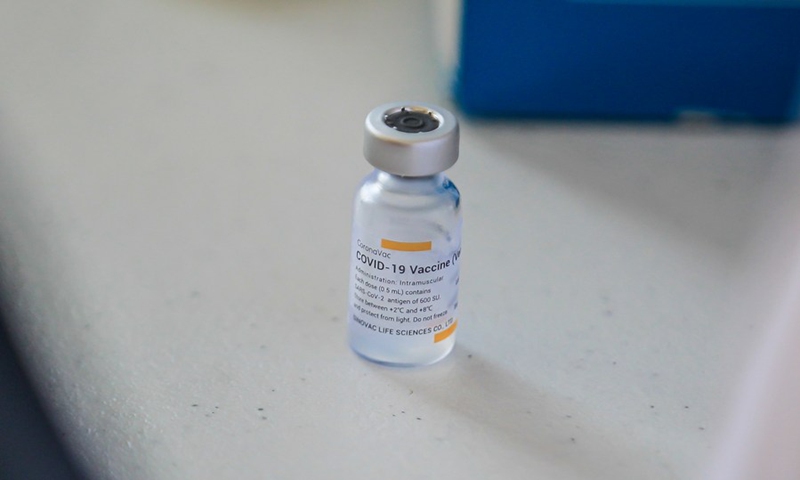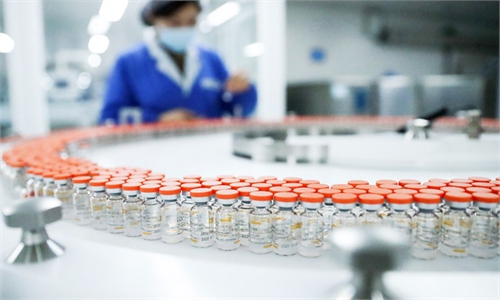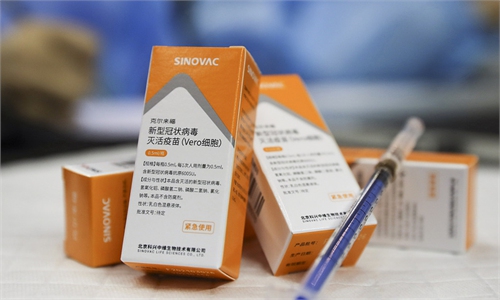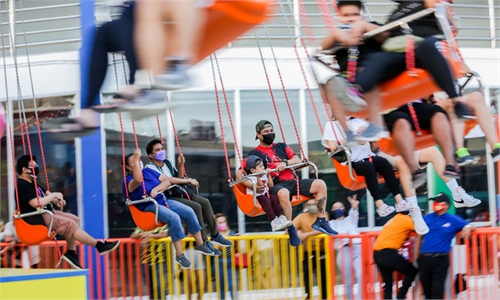
A vial of the Sinovac COVID-19 vaccine is seen at a vaccination site in Manila, the Philippines on May 1, 2021. (Xinhua/Rouelle Umali)
The latest study results published on the Lancet shows that Sinovac's COVID-19 shot has robust immunogenicity in people living with HIV after a two-dose regimen, but antibody responses in this population are slightly lower than in other control groups. No serious adverse reactions were reported during the study.
The study was reportedly the largest sample-size study so far of people with HIV receiving an inactivated COVID-19 vaccine.
Immunogenicity following CoronaVac in people living with HIV seems strong but has a reduced efficacy rate as compared with people with no known immunosuppression disease. The findings highlight the need for strategies to improve vaccine immunogenicity in people living with HIV.
The conclusion bodes well despite previous data suggesting that people living with HIV might have poor or delayed responses to vaccines, or a reduced duration of immunogenicity after vaccination against pneumococcus, influenza, hepatitis A and B,5-7, and yellow fever.
People living with HIV might have a poor or delayed response to vaccines, mainly when CD4 cell counts are low, and data concerning COVID-19 vaccines in this population are scarce, the result report said in study background.
The controlled study enrolled 511 participants, among which 215 adults living with HIV who received regularly follow-ups at the University of Sao Paulo HIV/AIDS outpatient clinic in Sao Paulo, Brazil, and 296 were people with no known immunosuppression disease.
Although people with HIV have been acknowledged as susceptible to complications caused by common viral respiratory diseases, such as influenza, the interaction between HIV and SARS-CoV-2 is still unclear. Some epidemiological data suggests there being no greater risk of detrimental outcomes of COVID-19 among people living with HIV, especially those with well controlled HIV infections, said the study report.
Strategies should be developed to improve vaccine-induced immunogenicity in people living with HIV, especially in the subgroup with low CD4 cell counts. Possible approaches include booster doses or administration of higher antigen titres per vaccine dose, observers suggested.
In September, 2021, the Brazilian Immunization Program rolled out booster doses for COVID-19 vaccination regimens, prioritizing adults aged 60 years and older and those with immunosuppressive conditions, including people living with HIV.
More than 38 million people are estimated to be living with HIV worldwide, with almost 1 million of all known cases living in Brazil.
China has more than 1.05 million people infected with HIV as of 2021, so the study provides valuable insight for such people in making decision on inoculation, Zhuang Shilihe, a Guangzhou-based immunologist, told the Global Times.
With the overlap of these two pandemics, it is essential to reinforce strategies to mitigate the damage caused by the SARS-CoV-2 pandemic in an already vulnerable HIV population, said the research group of the study.
Not just people living with HIV need to be considered. There are other immunocompromized people and a large number patients with other chronic diseases in our society, and they should not be ignored. More solid research is needed to see if the vaccine is safe and effective for these groups. "The collaborative results of researchers from various countries provides important data support for these special groups," said Zhuang.




